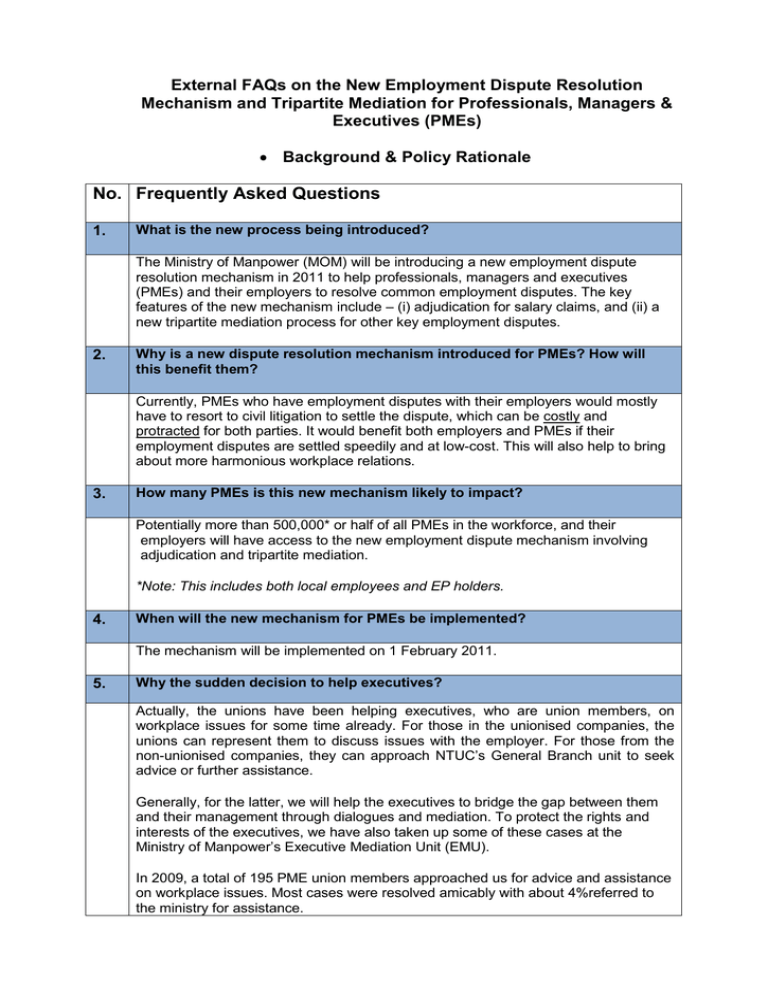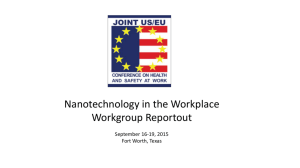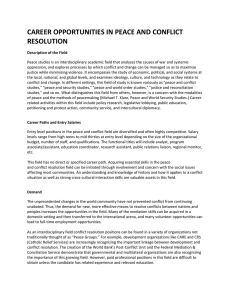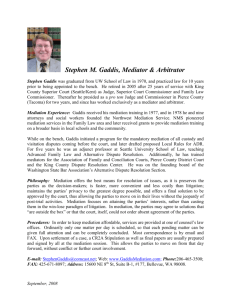Tripartite Mediation
advertisement

External FAQs on the New Employment Dispute Resolution Mechanism and Tripartite Mediation for Professionals, Managers & Executives (PMEs) Background & Policy Rationale No. Frequently Asked Questions 1. What is the new process being introduced? The Ministry of Manpower (MOM) will be introducing a new employment dispute resolution mechanism in 2011 to help professionals, managers and executives (PMEs) and their employers to resolve common employment disputes. The key features of the new mechanism include – (i) adjudication for salary claims, and (ii) a new tripartite mediation process for other key employment disputes. 2. Why is a new dispute resolution mechanism introduced for PMEs? How will this benefit them? Currently, PMEs who have employment disputes with their employers would mostly have to resort to civil litigation to settle the dispute, which can be costly and protracted for both parties. It would benefit both employers and PMEs if their employment disputes are settled speedily and at low-cost. This will also help to bring about more harmonious workplace relations. 3. How many PMEs is this new mechanism likely to impact? Potentially more than 500,000* or half of all PMEs in the workforce, and their employers will have access to the new employment dispute mechanism involving adjudication and tripartite mediation. *Note: This includes both local employees and EP holders. 4. When will the new mechanism for PMEs be implemented? The mechanism will be implemented on 1 February 2011. 5. Why the sudden decision to help executives? Actually, the unions have been helping executives, who are union members, on workplace issues for some time already. For those in the unionised companies, the unions can represent them to discuss issues with the employer. For those from the non-unionised companies, they can approach NTUC’s General Branch unit to seek advice or further assistance. Generally, for the latter, we will help the executives to bridge the gap between them and their management through dialogues and mediation. To protect the rights and interests of the executives, we have also taken up some of these cases at the Ministry of Manpower’s Executive Mediation Unit (EMU). In 2009, a total of 195 PME union members approached us for advice and assistance on workplace issues. Most cases were resolved amicably with about 4%referred to the ministry for assistance. 6. How would the tripartite mediation mechanism be useful in resolving executives’ workplace disputes as compared to MOM’s Executive Mediation Unit? The current effectiveness of these interventions, for executives in non-unionized companies is limited as there is no legal enforcement for the management to attend the mediation session, either at the company or MOM level. The new changes would provide a tripartite mediation mechanism which requires compulsory attendance from management at the mediation sessions together with the executives. This allows the tripartite partners to play a more effective mediating role and help resolve the workplace disputes. 7. Is it necessary to change the law? Singapore’s workforce is changing. Looking at the Singapore Workforce in 2009, PMETs formed 52% of resident workforce in 2009 compared to 42% in 1999. This trend is unlikely to reverse and we need to accommodate these changes. In recognition of the need to expand coverage to the growing market of PMETs, the Employment Act was amended in 2009 to allow junior executives who earn $2,500 and below to have access to the Labour Court to pursue salary claims. For the other executives, their only legal recourse is to take the company to civil court in order to enforce their contractual rights, which is costly and time-consuming for both parties. This change of the law aims to provide a cheaper and faster avenue of dispute resolution, eventually helping to bring about more harmonious workplace relations. 8. In 2009, PMETs accounted for a total of 43% of the workplace dispute cases coming to the General Branch unit from the non-unionised sector. This will only grow as the workforce profile continues to change in our knowledge economy as more PMEs are emerging. Thus, the proposed amendments are timely. Who will be helped? An estimated 46,033 of the NTUC’s 50,620 GB members earning $2,500 to $4,499 are from non-unionised companies. They will all benefit from the changes to the law. Tripartite Mediation - Eligibility Criteria No. Frequently Asked Questions 9. Who is eligible for this process? PMEs in non-unionised companies who are members of a registered trade union (currently without any individual representation rights), and earning up to a basic salary of $4,500, will have access to a new tripartite mediation process to resolve their employment disputes with employers. Members of NTUC affiliated unions must have been union members for at least 6 months with no arrears in payment of membership fees. Employers have the right to object on certain grounds, for example if the employees concerned are employed in senior management positions, or involved in IR functions or any other functions that may give rise to a conflict of interest. 10. Who does PME refer to? Managers and executives are employees with executive and supervisory functions. These functions include the authority to influence or make decision on issues such as recruitment, discipline, termination of employment, assessment of performance and reward, or involvement in the formulation of strategies and policies of the enterprise, or the management and running of the business. For the purpose of this mechanism, they also include professionals with tertiary education and specialised knowledge and whose employment terms are comparable to those of executives and managers. 11. Why are Technicians excluded from this process? Technicians are covered under the Employment Act, and are already covered for basic employment terms and conditions. 12. Why must the PME be a member of a union? The objective of this mechanism is to help the PMEs who currently have no recourse for workplace disputes. As this mechanism is an initiative of the tripartite partners, involving government, employer and union, Thus the PME who wishes to use this service has to be a union member. 13. Why is the salary limit to have access to the process capped at $4,500? It is an objective measure and moreover if we look at the workforce data, it is one that will provide a reasonably broad coverage. With this eligibility criterion, an estimated 70% of the total workforce will have coverage in one form or another. 14. Why is it that PME union members from unionised companies do not have access to the mechanism? PME union members who are entitled to full or limited representation by their trade unions under the Industrial Relations Act already have existing mechanisms to resolve their disputes with employers through union representation. Thus, they will continue to use their existing mechanisms and will not need to have tripartite mediation. 15. If a PME fulfills all the eligibility criteria but is earning above $4,500, would MOM still mediate if the employer agrees to attend the mediation session? *refer to Qn 12 for eligibility criteria* These members can still approach the NTUC GB Unit. In some cases, they will be referred to the MOM’s Executive Mediation Unit (EMU) which provides voluntary mediation services if both the PME and employer to agree to mediation. 16. Can Rank & File employees in non-unionised companies make use of the Tripartite Mediation service? No, the rank & file employees will not be eligible for this service. Tripartite Mediation is mainly for employees in executive positions. If rank and file employees have issues relating to statutory claims, they can approach their union or NTUC’s GB Unit for assistance or submit the claim to MOM through MOM’s eappointment service. If it is a non-statutory claim, NTUC GB Unit will assist them by mediating their case with the management. However, the best recourse for Rank and File employees to negotiate for benefits is to form a union in their workplaces. They can approach NTUC’s GB Unit or NTUC’s Membership Department for assistance in forming a branch in their work place. 17. Are contract workers/outsourced staff covered under this process? If the contract worker fulfills the eligibility criteria, he would be covered under this process. Tripartite Mediation - General Procedures No. Frequently Asked Questions 18. How should a PME initiate the process for tripartite mediation? Can employers initiate tripartite mediation? If a PME union member wishes to subject his dispute to tripartite mediation, he would first be required to inform his union or NTUC General Branch (GB) Unit. The union or NTUC’s GB Unit may then, on his behalf, notify MOM to arrange for tripartite mediation. MOM will lead the tripartite mediation session to help the employer and the PME concerned to resolve the employment dispute. The employer and the PME will be assisted by tripartite mediation advisors who will facilitate an amicable settlement. Tripartite mediation advisors, nominated by the tripartite partners, will be appointed by the Minister for Manpower. The mechanism is targeted to help employees as part of the pre-adjudication process to help settle their salary claims. (to resolve the conflicts at the lowest level, the union may help to contact the management to try to reach an amicable settlement before cases goes to Tripartite mediation) Employers are not able to initiate tripartite mediation. 19. Why is there a time-bar for claims at tripartite mediation? Claims must be lodged within 12 months from the occurrence of the dispute. But for disputes arising out of or as a result of termination of the employment contract eg. notice pay and pay in-lieu for unutilised annual leave, claims must be lodged within 6 months from termination. We want to encourage executive employees to come forward quickly to seek advice and assistance for their cases. The parties’ recollection of the facts may diminish over time and this lessens the likelihood of successful resolution by tripartite mediation. The time-bar is consistent with the current time-bar for claims under the Employment Act. 20. Why do I need to be a union member for at least 6 months before I can be eligible for the tripartite mediation? This is a benefit extended to union members and to prevent people from joining the union only when they have a work issue. Also to prevent the misuse of this service, we need to set the criteria of at least 6 months membership before a union member can be eligible for this service. 21. If an employee has other claims which are not in the pre-defined list but would like to surface them during tripartite mediation, can he/she do so? Tripartite mediation covers issues relating to salary claims, breach of individual employment contracts and retrenchment benefits. Breach of contract refers to situations where either the employer or the employee is unable or unwilling to comply with the terms and conditions set out in the contract. This covers a broad range of issues (such as contractual benefits, notice procedures, confidentiality and restraint of trade, etc) and our experience has shown that most of the claims raised by PMEs currently fall within these three areas. If PMEs have claims beyond the pre-defined list of disputes, they can continue to have access to MOM’s voluntary mediation service, which requires both parties to agree to mediation. 22. What is the expected success rate of tripartite mediation? How effective this system is depends on how cooperative employers and employees are. Based on our strong tripartite partnership, we have a fair chance that majority of the cases can be resolved. 23. If an employee/employer is not satisfied with the outcome of settlement of the tripartite mediation, what would be the recourse? If the dispute cannot be resolved through mediation, he may pursue his salary claims through an adjudication process by MOM. For other claims not settled at mediation, he may pursue his claims through the civil courts. The Tripartite Mediation is a low cost process aiming to helping the PME to sort out their dispute quickly. While the individual can decide to withdraw their case during the process, they are strongly advised against it as filing a civil suit will be more costly and time consuming. 24. How will executives in non-unionised companies be assisted? These executives will be assisted in areas of salary claims, breach of contract and retrenchment. For claims on salary, they will only be eligible to claim up to $20 000. 25. I am a GB member in a unionized company. May I make use of the Tripartite Mediation service? For GB members in unionized companies, they will be eligible for limited representation on issues of retrenchment, dismissal, breach of contract and victimization. The union will assist to refer the case to the arbitration court if necessary. Tripartite Mediation is for GB members in non unionized company. 26. Do I need to pay any fees for Tripartite Mediation and how long will the process take? If you are a union member of an NTUC affiliated union, you will not need to pay anything. The cost will be absorbed by your union. It is estimated that the process may take about 5-6 weeks from the date the case is lodged with MOM. 27. What is the difference between the assistance that unions can provide for me vs my Human Resource department? In general, we encourage employees to settle their disputes amicably with their employer. The HR department is likely to advise based on the company’s HR polices and related administrative procedures. Thus, at times a third party may be necessary to help resolve a dispute between an employer and the employee, especially when both parties are unable to reach an amicable solution. The union will mediate and seek to reach a win-win solution for both parties; ensuring the employee’s personal interest and employer’s business sustainability is taken into consideration. 28. Where can I go to look for help? There are a few ways you may contact us. You may send in your enquiry through Aunt Iris at http://uportal.ntuc.org.sg/UMembers, call our customer service hotline at 6213 8008 or walk in to our Member Services Centre at: No.1 Marina Boulevard #B1-01 One Marina Boulevard Singapore 018989 29. Where can I find more information about this service? You may get the information from MOM’s website at www.mom.gov.sg or NTUC’s website at http://uportal.ntuc.org.sg/UMembers. Alternatively, you may also contact NTUC’s customer service hotline at 6213 8008.






